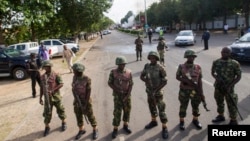Amnesty International says Nigerian police and security forces routinely torture people in detention, many of whom are arrested without evidence during large-scale sweeps.
Amnesty International said torture has become the routine way of doing business for Nigerian police and security forces.
“The magnitude, the scale of the abuses we are seeing is quite high ... It is inconceivable that the chain of command is not aware of it. It is a problem that is evident, visible, that cannot be ignored so in that sense we believe that the system has failed and that the highest authorities have failed to address this issue,” said Amnesty’s Africa Research and Advocacy Director, Netsanet Belay.
He said Amnesty has documented 12 common types of torture.
“Beatings with whips and gun butts, machetes, batons, sticks. But we have also seen a high prevalence rate of more abusive methods like tying detainees on a rod by their knees and elbows and suspending them on a roasting spit, extracting nails and shooting people in the leg or foot, particularly by the military,” said Belay.
Amnesty said women in detention were sexually assaulted. Detainees are held “incommunicado” without access to lawyers or family members.
Amnesty said in the northeast since 2009, Nigerian security forces have detained as many as 10,000 people, including children as young as 12 years old.
Belay said investigations were slow, and sometimes nonexistent, and detainees were held in extremely poor conditions at military facilities.
“People arbitrarily arrested and detained without any evidence are waiting a significantly long period of time for them to be cleared. In the process, most of them are dying or being subjected to various forms of torture, including extrajudicial execution at times,” he said.
Belay said the situation has gotten worse since the declaration of emergency rule in May 2013 empowered the army to detain civilians as part of the hunt for Boko Haram.
These are not new allegations. In August, Amnesty and Voice of America released footage obtained independently and taken on different devices of security forces and allied militias in the northeast executing detainees.
Nigeria government spokesman Labaran Maku, said the Amnesty report released Thursday was part of a smear campaign.
“Amnesty International has consistently in the course of this insurgency sought to tarnish the image of Nigeria, to tarnish the image of our armed forces. It has always brought up cooked up reports,” said Maku.
He said there were sufficient measures in place within military high command to address abuses.
Amnesty said torture with impunity was a nationwide practice, not limited to the northeast.
The group said it has interviewed hundreds of detainees during the past decade and visited police stations and prisons around the country. Researchers said police lack the capacity to investigate crimes like robbery and instead routinely used torture as a “shortcut” to close cases or get bribes.
Belay said innocent people were serving jail time.
“Since extracting confession by torture is quite commonplace, as a routine method by police particularly, in a lot of cases confessions obtained by torture are used as part of the prosecution for suspects,” he said.
The Ministry of Police Affairs denied this and said it investigated any cases of what it called “indiscipline.”
Nigeria is signatory of seven international conventions prohibiting torture. Its constitution forbids it, but torture is not a criminal offense in Nigeria.
Amnesty is calling on Nigerian lawmakers to criminalize torture and on the government to strengthen oversight measures like routine inspections of prisons to root out abuses and hold perpetrators accountable.




